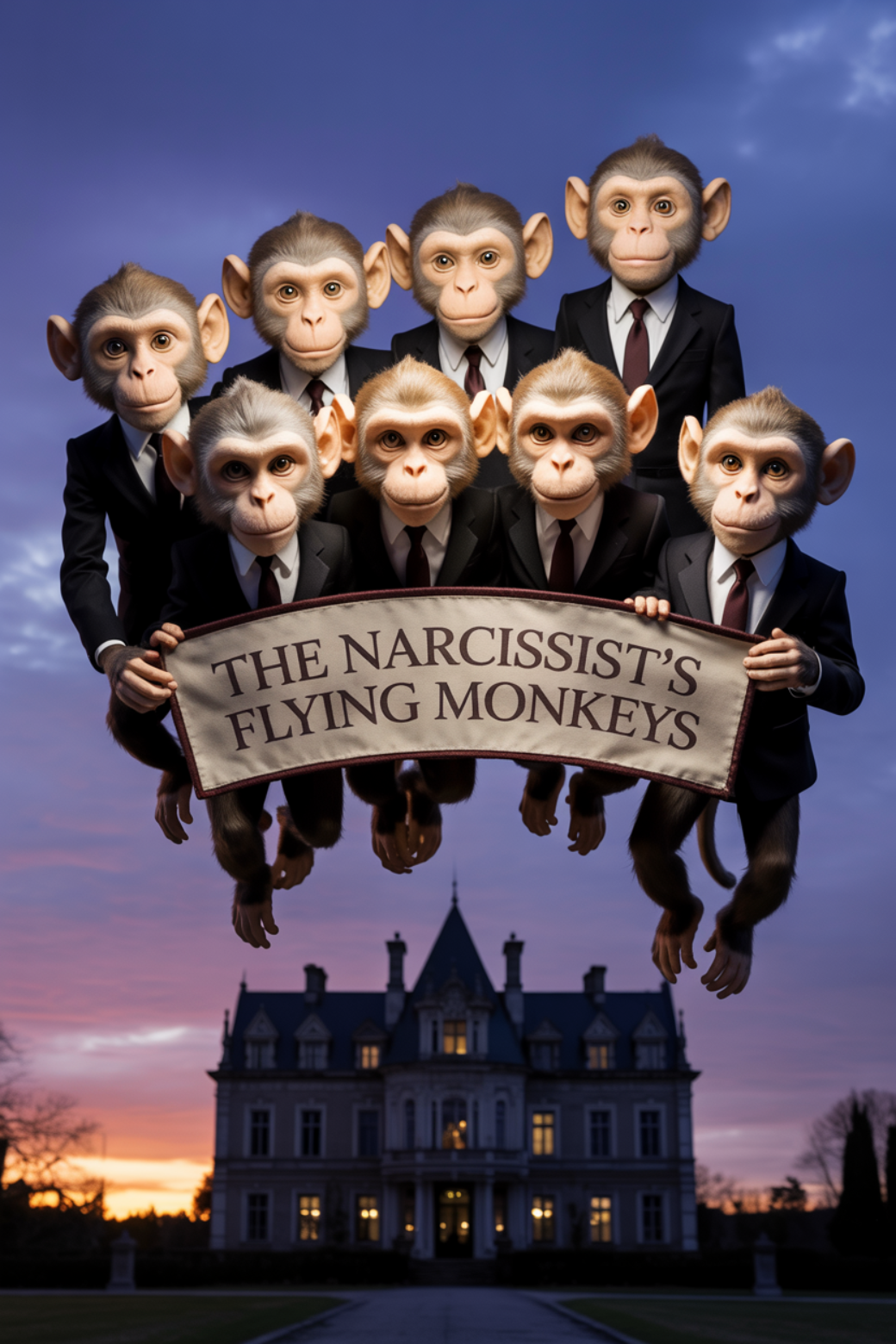Now Reading: The Narcissist’s Flying Monkeys: How They Use Others to Destroy You
- 01
The Narcissist’s Flying Monkeys: How They Use Others to Destroy You

The Narcissist’s Flying Monkeys: How They Use Others to Destroy You
Ever Feel Like There’s a Whole Team Turned Against You—All Led by One Puppeteer?
It starts with one narcissist calling the shots. Then suddenly, friends, family, or co-workers are echoing their accusations or spreading their rumors. You’re left defending yourself from multiple directions, thinking:
- “Why is everyone suddenly ganging up on me?”
- “Did I do something wrong—or am I being set up?”
- “How do I fight an army of people I once trusted?”
This isn’t just paranoia. It’s a narcissistic phenomenon known as “flying monkeys,” where the narcissist recruits others to help them discredit, intimidate, or isolate you—just like the Wicked Witch in The Wizard of Oz.
1. What Are Flying Monkeys?
The term “flying monkeys” comes from The Wizard of Oz, where the Wicked Witch commands her winged minions to do her bidding. In a narcissistic context, flying monkeys are enablers, allies, or unwitting participants who carry out the narcissist’s smear campaigns, harassment, or manipulations.
Key Traits of Flying Monkeys
- They believe or repeat the narcissist’s narratives without question.
- They may be ex-friends, family members, or co-workers turned against you.
- They execute the narcissist’s dirty work—spreading rumors, collecting info on you, or attacking your character on their behalf.
Bottom Line: Flying monkeys often think they’re doing the “right thing,” not realizing they’re pawns in the narcissist’s scheme.
2. How Narcissists Recruit & Weaponize Them
A. Grooming Through Charm & Lies
- Flattery & False Victimhood: The narcissist paints themselves as the “poor misunderstood soul,” winning allies’ sympathy.
- Selective Sharing: They provide distorted or one-sided information to shape how the flying monkeys see you.
B. Setting You Up as the Villain
- Smear Campaigns: Telling outrageous stories about your “cruelty” or “incompetence,” twisting facts to demonize you.
- Triangulation: They pit you against another person, making it seem like you are the aggressor.
C. Reward & Punish
- Approval: Loyal flying monkeys receive praise, favor, or inclusion in the narcissist’s inner circle.
- Condemnation: Anyone who questions the narcissist’s motives is labeled disloyal or manipulated—and risks becoming a target themselves.
Statistic: A survey in the Journal of Psychological Manipulation (2021) shows 68% of narcissistic abuse survivors cite flying monkeys as a major factor amplifying the abuse—often causing long-term emotional distress.
3. Common Tactics & Targets
Tactic 1: Gossip & Whisper Campaigns
- Method: Quietly spreading half-truths or outright lies about you—so that you look suspicious before you even speak.
Tactic 2: Social Exclusion
- Method: The narcissist instructs flying monkeys to uninvite you from gatherings, block you on social media, or freeze you out at work.
Tactic 3: Information Gathering
- Method: Flying monkeys spy on your personal life or eavesdrop at work, reporting your words or actions back to the narcissist.
Tactic 4: Public Shaming or Ambush
- Method: Confronting you in a group setting or social media thread, blindsiding you with accusations.
Who Gets Targeted?
- Ex-Partners: After a breakup, the narcissist may rally mutual friends or family to harass you.
- Family Scapegoats: A narcissistic parent might enlist siblings to maintain their family narrative.
- Workplace Outsiders: A narcissistic boss could turn other employees against you to protect their image.
4. Real-Life Examples
A. Romantic Partner
💔 Scenario: After leaving a narcissistic ex, you notice old friends start questioning your mental stability—stories you shared privately with your ex are now twisted into rumors.
💥 Effect: You feel betrayed, isolated, and defensive, unsure who you can trust.
B. Family Member
👨👩👧 Scenario: A narcissistic parent enlists siblings to “check on you,” collecting details of your personal life to use against you.
💥 Effect: You constantly feel monitored, leading to anxiety, self-censorship, and emotional exhaustion.
C. Boss/Manager
💼 Scenario: A narcissistic boss instructs co-workers to document your mistakes or exaggerate any minor errors, painting you as incompetent.
💥 Effect: You face unfair performance reviews, less support, and a hostile work environment.
D. Co-worker
👥 Scenario: A colleague with narcissistic traits befriends other team members, convincing them you’re the office “problem.” They publicly criticize your ideas or run to the boss with exaggerated complaints.
💥 Effect: Your reputation suffers, you’re left isolated, and you might dread going to work.
5. Psychological & Emotional Toll
- Chronic Stress & Anxiety
- The feeling of being ganged up on keeps you hypervigilant and exhausted.
- Isolation & Self-Doubt
- When friends or trusted people turn against you, you question yourself and may withdraw from social life.
- PTSD Symptoms
- Some survivors report nightmares, flashbacks, and intense fear of further betrayal (National Institute of Mental Health).
- Reputation Damage
- Their smear campaigns can destroy professional and personal relationships, sometimes irrevocably.
Note: The narcissist’s goal is total control, even if it means isolating you from every pillar of support in your life.
6. Applying the IMC Method™
The IMC Method™—Identify, Minimize, Control—helps you handle flying monkeys and reclaim your power.
1. Identify
- Recognize the Patterns: Observe who is suddenly acting differently toward you—did their perspective on you shift after interacting with the narcissist?
- Name the Behavior: Acknowledge you’re facing a flying monkey situation, not a “group misunderstanding.”
2. Minimize
- Limit Contact: Reduce unnecessary interactions with flying monkeys—focus on neutral or factual communication if forced to engage.
- Don’t Argue: Trying to prove your innocence to a flying monkey can fuel their belief in the narcissist’s narrative.
3. Control
- Set Boundaries: Politely decline to discuss personal topics with them; keep things professional if it’s a work scenario.
- Seek Objective Support: Confide in friends or mentors who haven’t been tainted by the narcissist’s influence—or speak to a therapist.
- Document Everything: Keep records of interactions, messages, or incidents—this provides evidence if you need to defend yourself.
Pro Tip: Going No Contact or Low Contact with both the narcissist and their flying monkeys is often the surest path to peace.
7. Key Takeaways & Final Word
- Flying Monkeys Aren’t Just in Fairy Tales
- Narcissists skillfully recruit others to do their dirty work—it’s a coordinated form of manipulation.
- You’re Not Imagining It
- If you suddenly see multiple people aligning against you, consider the source—a narcissist often stands behind the scenes.
- Use the IMC Method™
- Identify who’s being influenced.
- Minimize contact or emotional engagement.
- Control your boundaries and documentation.
- You Deserve Truth & Support
- Don’t let flying monkeys isolate you; seek real allies—friends, family, or professionals who see the bigger picture.
Final Word
Narcissists love having a crowd on their side—flying monkeys help them distort reality, attack you from all angles, and amplify their power. But awareness is your greatest ally. By recognizing the role of flying monkeys, setting firm boundaries, and leaning on unbiased support, you can withstand their onslaught and protect your reputation, sanity, and peace of mind.
Remember: You are not alone, and you do not have to fight every battle on their turf. Stay grounded, focus on truth, and let the narcissist’s own manipulations expose themselves over time. Tired of the Narcissistic Mind Games? Get the Tools to Break Free.
Disclaimer: This guide is for educational purposes only and does not replace professional psychological or legal advice. If you believe you’re experiencing organized harassment or abuse, consult a qualified mental health professional or legal counsel.















